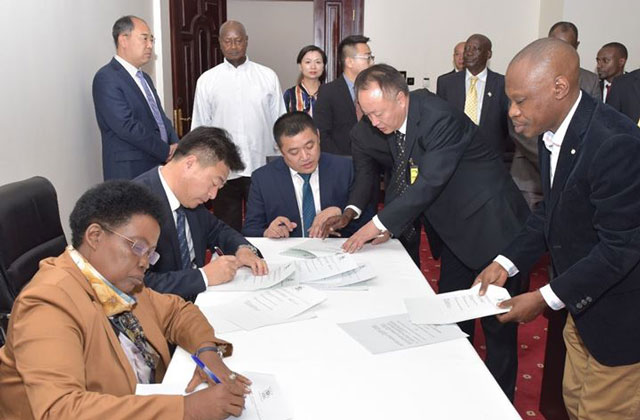
China gave Uganda another US$350 million to construct the Entebbe-Kampala Expressway, now in use. In eastern Uganda, Guangzhou Dongsong Energy Group Ltd opened in October, a polymetallic industrial complex expected to cost up to US$ 620 million when it is fully complete next year.
China’s second look at its Chinese loan portfolio with Africa comes at a time when many observers are having doubts about the sustainability of Chinese debt to Africa.
Some African countries are said to be spending almost 80% of their revenues to service these loans, which analysts say are becoming a burden especially given that their impact is yet to be felt in economic growth terms.
Top executives from China’s main project insurer, China Export and Credit Insurance Corporation or Sinosure, recently stopped short of saying some infrastructure projects on the continent may after all, not be that viable.
This was after a top executive noted that the firm had already incurred losses of more than US$ 1 billion on the Ethiopian-Djibouti railway alone.
Wang Wen, Sinosure’s principal economist recently told a forum on the Belt and Road infrastructure financing in Hong Kong that the planning behind many of China’s major infrastructure projects abroad has been “downright inadequate” leading to huge financial losses.
For instance, the Ethiopian government has already asked for the restructuring of the US$ 4 billion debt of the Addis Ababa-Djibouti cargo railway, which was opened with fanfare recently.
“Chinese developers and financiers of projects in developing nations need to step up their risk management to avoid disaster. We can see the mistake of the Addis-Djibouti Railway line, which has cost Sinosure a US$ 1 billion loss,” said Wang.
Ramathan Goobi, an economics lecturer at Makerere University Business School in Kampala told The Independent on Nov.16 that China has perhaps realized that the pace at which they were giving loans to African governments was unsustainable.
“They were perhaps too excited that they were taking over from the West in terms of tapping into this lucrative region,” Goobi said, “So the scramble for Africa made them throw caution to the wind.”
Patrick Tumwebaze, the executive director of Uganda Debt Network also told The Independent on Nov. 16 that China could be having a change of heart because many African countries are already defaulting on their Chinese debt obligations.
For Julius Mukunda, the executive director of the Civil Society Budget Advocacy Group (CSBAG), it is very obvious what China is trying to do.
Mukunda said already observers in the international financial system have been cautioning China saying the infrastructure loans are not working and that China is likely to lose out on billions of dollars.
FOCAC turns into debt relief summit
In September, this year, as dozens of African heads of state flew into Beijing for this year’s Forum on China-Africa Cooperation, many of them had one thing on their mind: asking the Chinese government to restructure their debts.
The Ethiopian government was reportedly the first country to ask for an extension of the repayment terms of its 700km Djibouti Ethiopia railway, following its underuse, thanks to power shortage. In the same month, Botswana also asked for reprieve from China. President Mokgweetsi Masisi said Botswana had requested for debt relief to China and got a debt and interest cancellation of US$ 7.2 million.
The Kenyan government also asked Beijing to consider providing half of the US$ 3.8 billion for the second phase of the Naivasha-Kisumu standard gauge railway as a grant and the other half as a loan. But Zambia denied reports that it was in talks with Chinese companies for a debt-to-public-utility swap.
Fortunately for Ethiopia, the Chinese government agreed to extend the maturity period and now, instead of paying the loan over the next 10 years, it will be paid over the next 30 years.
Reality check for China
Analysts say the continent’s debt problem could worsen, especially given the obscure nature in which they are signed.
Tim Jones, an economist at the Jubilee Debt Campaign in Nairobi told The East African in October, this year, that Africa’s debt problem is worsening and many lenders bear responsibility, not just China.
“We need new rules to make all lenders publicly disclose loans to governments at the time they are given,” Jones said,“We also need to see these lenders made to restructure and reduce debts.”
Deborah Brautigam, the director at the Johns Hopkins University’s China-Africa Research Initiative has been quoted as saying the risk for the African borrowers relates to the projects’ profitability.
“It’s always important to look at whether these projects will generate enough economic activity to repay these loans, as opposed to being seen as merely ribbon-cutting opportunities,” Brautigam said.
 The Independent Uganda: You get the Truth we Pay the Price
The Independent Uganda: You get the Truth we Pay the Price




DO YOU NEED A CAR BUT BANKS CAN’T ASSIST YOU? Car Loan Warehouse can assist* even if you are: –
Black
DO YOU NEED A CAR/ HOUSE /APPARTMENT / BUSINESS / COMMERCIAL/ PERSONAL LOAN BUT BANKS CAN’T ASSIST YOU?
Car Loan Warehouse can assist* even if you are:
-Blacklisted
-Low credit score
-Under debt review
-Sequestrated
For assistance visit http://www.clwh1002.com
*t&c apply